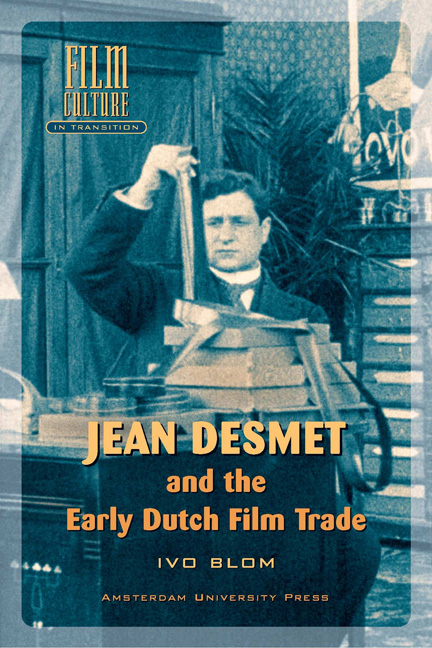Book contents
- Frontmatter
- Dedication
- Contents
- Preface
- Abbreviations, Unidentified Films and Historical Currencies
- Introduction
- I La Comète Belge: Jean Desmet’s Travelling Cinema, The Imperial Bio (1907-1910)
- II In The Beginning…: Film Distribution in the Netherlands Before Desmet
- III Gold Rush: In the Throes of Cinema Mania (1909-1914)
- IV Film Market Europe: Buying Films Abroad (1910-1914)
- V White Slave Girls and German Kultur: Film Rental and Distribution Strategies in the Netherlands (1910-1914)
- VI Onésime et Son Collègue: Competition (1910-1914)
- VII Das Ende vom Lied: The Impact of the First World War (1914-1916)
- VIII Quo Vadis?: Desmet’s Film Rental and Cinema Operation During the Great War (1914-1916)
- IX Afterlife: A New Career and the Beginning of a Collection
- X In Retrospect: Jean Desmet’s Place in Film History
- Notes
- Bibliography
- Photo Credits
- Film Culture in Transition
- Index of Film Titles
- General Index
VII - Das Ende vom Lied: The Impact of the First World War (1914-1916)
Published online by Cambridge University Press: 14 January 2021
- Frontmatter
- Dedication
- Contents
- Preface
- Abbreviations, Unidentified Films and Historical Currencies
- Introduction
- I La Comète Belge: Jean Desmet’s Travelling Cinema, The Imperial Bio (1907-1910)
- II In The Beginning…: Film Distribution in the Netherlands Before Desmet
- III Gold Rush: In the Throes of Cinema Mania (1909-1914)
- IV Film Market Europe: Buying Films Abroad (1910-1914)
- V White Slave Girls and German Kultur: Film Rental and Distribution Strategies in the Netherlands (1910-1914)
- VI Onésime et Son Collègue: Competition (1910-1914)
- VII Das Ende vom Lied: The Impact of the First World War (1914-1916)
- VIII Quo Vadis?: Desmet’s Film Rental and Cinema Operation During the Great War (1914-1916)
- IX Afterlife: A New Career and the Beginning of a Collection
- X In Retrospect: Jean Desmet’s Place in Film History
- Notes
- Bibliography
- Photo Credits
- Film Culture in Transition
- Index of Film Titles
- General Index
Summary
‘Owing to the European war of the last years, business in Holland was in a bad condition, so that for a long time we could not release the film and then we could rent it only a few times. We were even unable to sell it to the Colonies on account of the problems with shipping in the present time,’ wrote Desmet to the Cines head office in Rome. The First World War had farreaching consequences for the Dutch film world. The pre-war international network was disrupted, which led to shortages of films and changes in the international films on offer. New distribution methods, new kinds of audiences and new forms of competition in film distribution came to the fore. Desmet was affected by all these changes. The war marked the end of his distribution business and cinema ownership. By the end of the hostilities, little remained of the flourishing business of the pre-war years.
The Impact of the Outbreak of the First World War on the Dutch Film Trade and Film Availability in the Netherlands
The First World War did not have such disastrous consequences for the Netherlands as for Belgium, but its effects on the Dutch economy were profound, and they in turn affected the Dutch film trade. Coal shortages reduced railway traffic. The war at sea and the bureaucracy of the Dutch Overseas Trust Company slowed down deliveries by sea precisely at the moment when Brussels fell, and Berlin was being forced to concede a growing share of the market to London as the centre of the international film trade. From being a place of international transit for films, Berlin became just a place for national production. Import restrictions gave an enormous stimulus to internal German production, and exports to neutral countries such as the Netherlands increased. German and Italian films dominated the Dutch market to a greater extent than before the war. For the time being at least, the popularity of American movies was confined to Chaplin and the ‘serial’.
There were rumblings in the air in the summer of 1914. The murder of Archduke Franz Ferdinand, the heir to the Austrian throne, and his wife in Sarajevo and the ensuing ultimatum to Serbia duly got through to the Dutch press.
- Type
- Chapter
- Information
- Jean Desmet and the Early Dutch Film Trade , pp. 243 - 276Publisher: Amsterdam University PressPrint publication year: 2003



